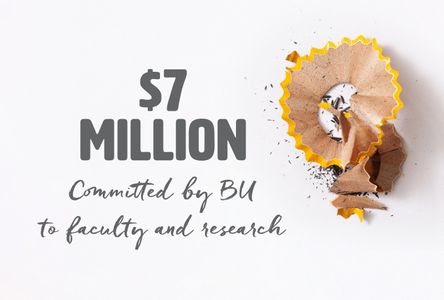Fresh Start
Fresh Start
How the Wheelock merger has revitalized BU’s commitment to education and human development
As it begins its second full academic year this fall, BU Wheelock College of Education & Human Development is fulfilling the University’s commitment to bring new attention to all the ways educators, counselors, youth advocates, and others can help children and their communities in Boston and around the country.

BU Wheelock, the school formed by the 2018 merger of BU’s School of Education and Wheelock College’s School of Education, Child Life, and Family Studies, has begun investing the $7 million in funding BU committed for faculty and research, resources that augment Wheelock’s $63 million endowment that was reserved for the school post-merger. A nationwide recruiting effort is underway for three new senior faculty; hiring junior faculty for teaching and research continues; and BU Wheelock has launched new initiatives for research and community service, including in the Boston Public Schools.
“The impetus for our early merger discussions grew out of a courageous recognition by the Wheelock College board and senior leadership that the college could not go forward alone,” says President Robert A. Brown. “What we quickly found is that we shared a common vision and commitment to urban public education, that Wheelock had a great tradition, and that we could see a path forward. We saw an opportunity to create a new entity that could continue the traditions of both institutions to service and outreach but, because of our combined institutional scale, could have a much larger impact in both education and practice-based research.”
Jean Morrison, University provost and chief academic officer, says the initiatives and investment efforts already underway demonstrate a commitment to honor both schools’ legacies while working together to build a new institution that is greater than the sum of those parts.
“Throughout this transition, BU has recognized the value, historical importance, and dedication to outstanding teaching and human services that Wheelock brings to our institution. The investments we’ve made and the work we’ve done together over the last two years have resulted in an invigorated new unit—the BU Wheelock College of Education & Human Development,” Morrison says. “We see it in the talented, energetic new voices we’ve welcomed to our teaching and learning community; in the bolstering of our existing programs and the launch of exciting new collaborative efforts within the college; and in the potential for new programs and areas of growth and outreach this merger has made possible.”
The establishment of a new school presents a once-in-a-generation opportunity to reassess and redefine what a college focused on both education and human development, within a major research university, should look like. The BU Wheelock community has started a series of workshops, discussions with experts in education, business, social innovation, and nonprofits, to explore these questions.

These conversations will help determine what David J. Chard, dean ad interim, calls the new school’s signature programs. The vision, or “guide star,” says Chard, will encompass everything that the school offers now and should develop in the future. For example, BU Wheelock prepares teachers to lead classrooms, while also educating students who work in a range of other meaningful positions, including counselors, child-life professionals, and youth advocates.
“We’re really drawing upon these experts, and simultaneously signaling to the country that we are building this new college, and that we have all these new resources to invest in it,” says Chard, who served as Wheelock College president before the merger.
Ziv Feldman (’07,’12), clinical associate professor and department chair for teaching and learning at BU Wheelock, says that the University’s commitment of resources and the energy devoted to developing a new vision will help the school attract top talent.

“One of the clear benefits of the merger is that it comes with resources that the college can use to help us grow,” Feldman says. “That includes identifying high-quality faculty to hire. That’s one of the key driving forces of growing an institution.”
Feldman, a former high school teacher who earned both his doctoral degree in education and master’s in mathematics education at BU, says the ongoing workshops to consider the school’s future represent a way to build on the University’s existing strengths.
“One thing that alumni should know is that the future of BU Wheelock is not being taken lightly. Thinking about our future path and our developing identity as a single college is really important,” he says. “We have excellent faculty, staff, and the resources now to help us build on our strengths, including teaching, research, and work within the community.

“Part of it entails our faculty continuing to do the work that they are passionate about, that they believe will have a profound impact on the field and on our surrounding communities. But it’s also thinking strategically about how we synthesize the work that those once separate institutions have done in a way that becomes a signature of this new college.”
BU Wheelock Investments and Initiatives
The benefits of the BU–Wheelock merger include increased spending, devoted endowments, community-based research initiatives, and a campaign to define the college’s future vision.
Investments in BU Wheelock
As part of the merger, BU committed $7 million to invest in new faculty and research initiatives. BU also agreed to reserve Wheelock College’s $63 million endowment to benefit BU Wheelock programs and operations. In addition, BU retained 31 Wheelock faculty members; most joined BU Wheelock, while others joined other faculties at the University.
CERES (Community-Engaged Research and Evaluation Sciences) Institute for Children and Youth focuses on applied research and evaluations of programs designed to improve education and life conditions for children and youth in historically disadvantaged communities. Among its evaluation projects: partnering with the Boston Debate League to create a continuous learning and improvement process for BDL’s debate-informed classroom program, and working with the Massachusetts Department of Youth Services to evaluate its efforts to support youth as they transition out of the state’s juvenile justice system..
The Aspire Institute is an innovation hub connecting educators, community partners, and families to improve education, human development, and community wellness. Their current programs include Teacher Support and School Leadership Support; Community Forums; and Professional Development focusing on culturally responsive teaching, social-emotional learning, academic content areas, and teacher-leader training.
Earl Center for Learning & Innovation enables teachers and students to explore technological advances and innovative practices. One project works with the BU School of Medicine and CityLab, a biotechnology learning laboratory for students and teachers in grades 7 to 12, to develop STEM (science, technology, engineering, and math) education programs. (Read more about the Earl Center on page 16.)
Workshops to define BU Wheelock’s future include meetings with the school community and leaders in a range of fields—such as higher education, nonprofits, business, and social innovation—to help identify opportunities to create signature research and service initiatives at the school.